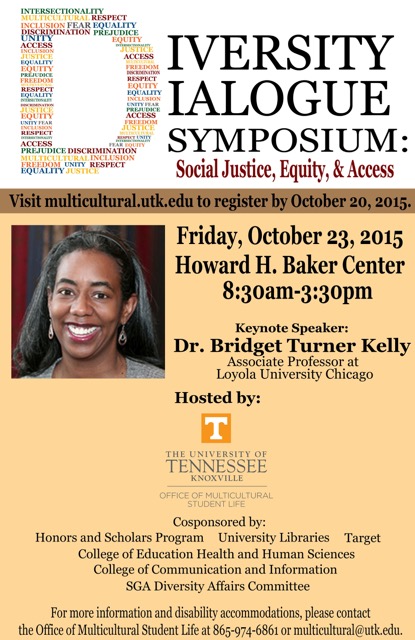By Janine Al-Aseer, CSPS Research Assistant & PhD Student
When you work with so many outstanding women from all over the globe, it can be easy to get lost in their shared strength, intelligence and tenacity. In fact, that is an issue we at the Center for Sport, Peace, and Society (CSPS) come across on a regular basis. But, as important as recognizing their similarities, we understand it is equally important to note their differences. And that is not only limited to our global work through the U.S. Department of State’s Empowering Women and Girls through Sports initiative, for which the CSPS serves as the cooperative partner, but also to our presence at the University of Tennessee.
 On October 23rd at the Baker Center on campus, the UT Office for Multicultural Student Life hosted a daylong Diversity Dialogue Symposium focused on social justice, equity and access. The event, which I attended on behalf of the CSPS, provided a space for students, faculty and community members to discuss how privilege, oppression and social justice play into the college experience.
On October 23rd at the Baker Center on campus, the UT Office for Multicultural Student Life hosted a daylong Diversity Dialogue Symposium focused on social justice, equity and access. The event, which I attended on behalf of the CSPS, provided a space for students, faculty and community members to discuss how privilege, oppression and social justice play into the college experience.
At the CSPS, we regularly partner with women working in the midst of situations of controversy nationally and internationally. It is part of the reason we feel so strongly about creating a safe space to dialogue about areas of controversy because it not only alleviates stress and fosters understanding, but also allows participants to collaboratively create solutions to the issues they face.
Some say that acknowledging differences is fracturing for the community, and can divide populations. Bridget Turner Kelly, Ph.D, keynote speaker for the symposium, claimed just the opposite.
“Hiding from controversial subjects is the opposite goal of higher education,” said Turner Kelly, a UT alum who specializes in racial identity development. “Intergroup dialogue acknowledges, honors and celebrates our unique racial and ethnic backgrounds.”
For Turner Kelly, like at the CSPS, intergroup dialogue is about inclusive discussion—not debate—regarding differences. And attendees to the symposium agreed.
“I think it’s important to acknowledge our differences,” said Sarah, a representative from the Knoxville Health Department. “It helps us learn more about one another.”
When we engage in dialogue about our differences, we create a mutual understanding that facilitates a growth in our knowledge base. This ensures students of varied gender, race, ethnicity, religion, socioeconomic class and nationality receive an equitable college experience.
For intergroup dialogue to succeed, there must be a knowledgeable, open-minded facilitator who asks the group questions without volunteering an opinion. The facilitator organizes the dialogues and assists in guiding the responses, ensuring all voices are heard and comments are expanded upon. Intergroup dialogue is comprised of various facets that allow the facilitator to navigate this terrain. These include: awareness (examining belief systems and raising self-awareness), cognitive development (exploring topics and learning), attribution training (examining groups and their stereotypes), behavior modification (deciding whether behavior can or should be modified), and experiential learning (activities that give you a taste of what it is like in other groups).
I know from experience that discussing our differences can be discomforting. But that uneasiness can lead to reflection and change. It can serve as a stop sign to acknowledge issue of social justice and equity on the road ahead. And, with more than 100 attendees to the symposium, dialogue between diverse groups of people is clearly a topic of relevance to faculty, students, administration and the neighboring community.
The Office for Multicultural Student Life is moving forward with groups on intergroup dialogue at UT in 2016 with the hope of fostering a campus environment where students are free to discuss cultural differences. Through respectful dialogue, we can explore those differences and come to solutions and common understandings that can lead to change. We know from experience.
To see pictures of the event from the Office for Multicultural Student Life, visit the Diversity Dialogue Symposium album on its Facebook page